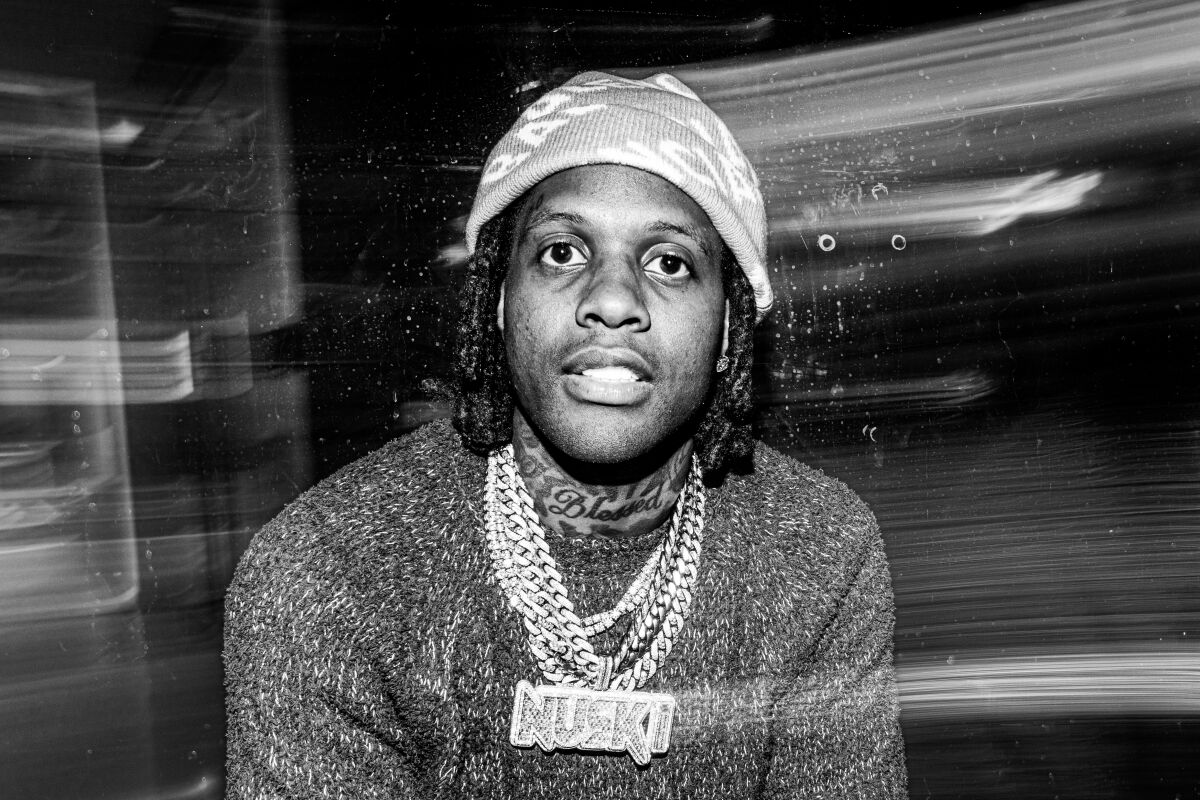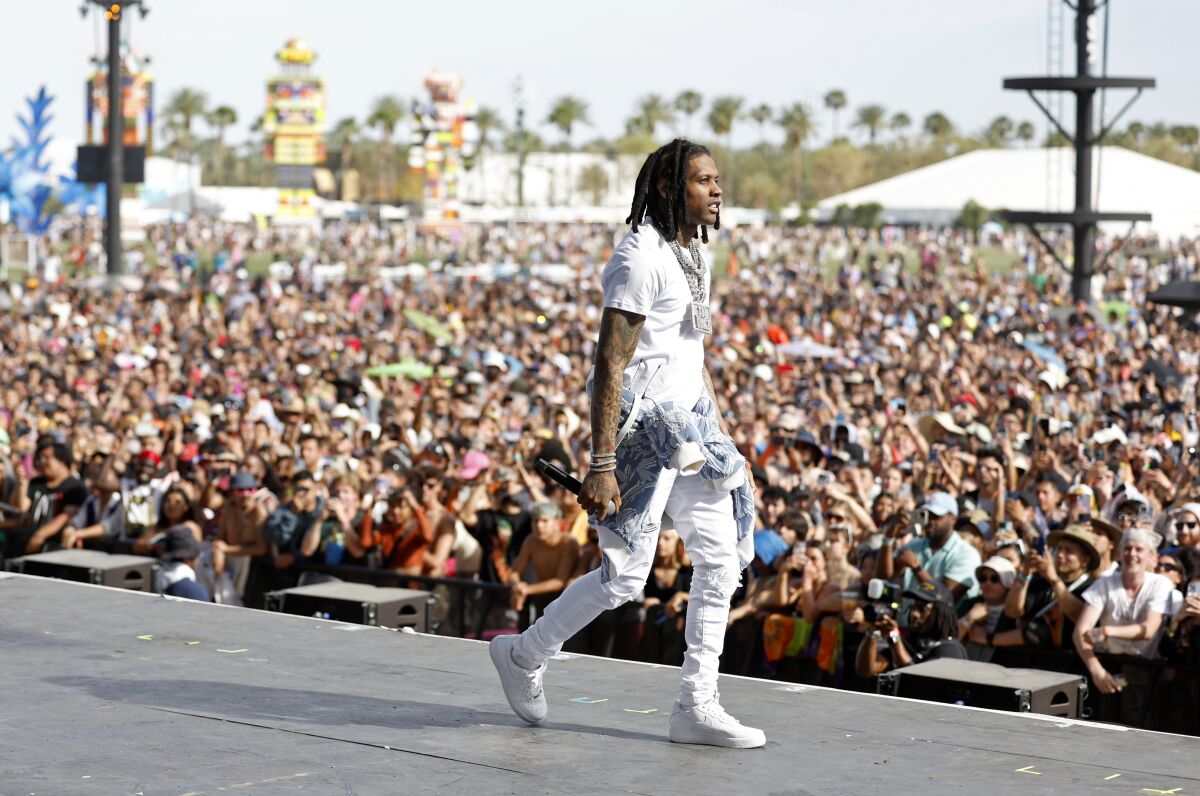Days before releasing his eighth solo studio album, “Almost Healed,” Lil Durk is cooled out at FaZe Clan’s Fairfax warehouse, a gaming-and-office playground where Twitch livestream rooms sit feet away from desk workspaces.
Activity is everywhere — above the towering waterfall that greets guests near the front door, there’s an equally large screen featuring one FaZe streamer running down challengers in “Fortnite.” On his first visit to the compound, Durk’s more interested in the basketball court in the adjoining area, where he shoots one-legged jumpers from the elbow with nonchalant ease.
Once he bores of hoops, he hops on a stray skateboard in the corner of the room, pushing just once before balancing his way across the court.
“I do everything,” he says with a sheepish grin.
Years after climbing from Chicago onto premier stages around the world, Durk has assumed the mantle of “The Voice,” speaking to and for the streets across multiple chart-topping albums. But the first voice on “Almost Healed” isn’t his — it belongs to Alicia Keys, gently prodding his mental state while playing the role of his therapist.
On album opener “Therapy Session,” accompanied only by a faint reverb, Keys notes a smattering of Durk’s recent tragedies; the fatal shooting of his friend and collaborator King Von in November 2020, and the killing of his older brother, Dontay Banks Jr., less than a year later.
“I want you to feel completely safe in this room,” Keys reassures Durk, who never says a word on the track. “Nobody can hurt you.”
Therapy is a new concept for 30-year-old Durk Banks; when asked about who he’d lean on in the past to get through hardships, “Allah” is his one-word answer. But earlier this year, he made the decision to seek professional help for the first time.
“On a microphone, I’m just having fun, rapping about whatever I’m going through,” he says. “In therapy, I’m going into the details of why, or when, or how.”
“Almost Healed,” which is projected to debut in the Top 3 behind Durk collaborator Morgan Wallen and Taylor Swift’s expanded “Midnights” on the Billboard 200, is led by ray-of-sunshine single “All My Life,” featuring J. Cole. After a children’s choir sings sugar-sweet melodies of overcoming all obstacles, Durk enters the fray to speak on his own journey,
“We were in the studio with Dr. Luke, and that was the first song he pulled up,” Durk recalls. “I sat on it for a week, wondering who could fit it because the song felt big. Then we thought about J. Cole, reached out and he knocked it right out.”
“All My Life,” currently No. 2 on the Billboard Hot 100, is undoubtedly the warmest moment on the album; many of the remaining songs are either energetic hits or melancholy tales of past traumas. Durk begins the standout track “Pelle Coat” with a mournful call that “they scared to come outside,” before breathlessly denouncing a barrage of internet rumors — no, he didn’t snitch on Von during a murder case (that has since been dropped); and no, he didn’t have a baby on his on-again, off-again partner India Royale.
“[I’m speaking on] what I’ve been dealing with, reasons I’ve been off the internet, reasons I haven’t been myself lately,” he says quietly. “I’m trying to fix it with family, and with friends.”
Earlier this year, Durk had planned to call the album “The Voice 2.0,” but after ASAP Rocky shot down the title with a blunt dismissal, the Chicago rapper made a last-minute pivot.
“‘Y’all need to call it something else, ‘The Voice’ doesn’t really do nothing,’” Durk’s manager, Peter Jideonwo, recalls Rocky telling them. “We had this powerful conversation that was almost three hours long, and Durk said the words ‘almost healed.’ We decided to go with that.”
Durk’s energy is reserved, his eternally bulging eyes hidden behind obsidian Chanel sunglasses. A collage of chains jostle for attention in the fluorescent light — most prominent is his Nuski pendant, in honor of his cousin McArthur Swindle, who rapped under the name OTF Nunu and was fatally shot in 2014.
Online, Durk’s name has swirled in blog-fueled beef after rival YoungBoy Never Broke Again dissed just about all of Durk’s friends and collaborators on “F— the industry Pt. 2”; in person, Durk sullenly proclaims he hasn’t even bothered to play the song.
“I don’t pay attention to any of that,” he says. “I used to say ‘Who’s the biggest, let me talk my s— back.’ But now, it’s ‘say whatever, do whatever.’ The money’s gonna talk, the consistency’s gonna talk.”

Lil Durk on country music star and collaborator Morgan Wallen: “He was nowhere near racist. That’s my dawg.”
(Annie Noelker / For The Times)
Instead, he lights up when asked about Wallen, the country superstar with whom he reconnected on “Stand by Me,” the penultimate song on “Almost Healed.”
Durk was wholly unfamiliar with Wallen less than three years ago. But after Wallen’s “Dangerous” album blocked his bid for his first No. 1 on the Billboard 200 with “The Voice,” Durk sought out a collaboration — admittedly to ensure his next album would be impossible to overlook. (Durk’s album “7220,” which features Wallen on “Broadway Girls” and was released in 2022, indeed became his first solo No. 1 album.)
“We live in two totally different worlds,” Durk says. “He’ll tell me, ‘Let’s go hunting, let’s go fishing.’ He’s opened my mind to a different view of life. I’m telling him about about clothes, all about the sauce. But he doesn’t care much about fashion.”
When he reached out in 2021, Durk hadn’t seen the viral video of Wallen drunkenly hurling the N-word in January 2021. Wallen himself told Durk of his brewing controversy and said the collaboration would have to wait, and Durk offered him a conversation to explain himself.
“I went and talked to him, to see what was up with [the video],” he says. “When I hung out with him, it was totally the opposite. He was nowhere near racist. That’s my dawg. I took my own risk, to show the world that he isn’t that.”

Lil Durk performs at Coachella in April.
(Frazer Harrison/Getty Images for Coachella)
In the midst of his own healing journey, Durk has put a renewed emphasis on his community through Neighborhood Heroes, his nonprofit aimed at bettering the futures of Chicago’s youth. The day before recording “All My Life,” Durk and the group brought five mayoral candidates to a dinner with several high school students, allowing them to speak firsthand of what they wanted from their future leaders.
In April, he launched the Durk Banks Endowment Fund, providing a pair of Chicago high school graduates with a full-ride scholarship to Howard University.
“The first day we sat down, he made it clear to me that this is a top priority,” Jideonwo says. “He said, ‘I want to give back in the most major way possible, I don’t want to do no turkey drives. I want to do big, impactful stuff that’s gonna shake the ground.”
Similar neighborhood-focused groups were around in Chicago during Durk’s upbringing, but he admits their impact on him as a teenager was limited. Against his mother and grandmother’s wishes, Durk strayed from school into the streets — “I was trying to be somebody I wasn’t at the time,” he says.
Durk eventually dropped out of high school and had his first of seven children at age 17. Around the same time, he doubled down on his rap dreams, catching local fire with the antagonistic “L’s Anthem” and signing to Def Jam in 2012.
Durk’s Auto-Tuned, half-rapped, half-sung delivery meshed seamlessly as hip-hop turned more melodic in the early 2010s; he rode that formula to success on 2013’s “Dis Ain’t What U Want,” his national breakthrough. The song was boosted further when Rick Ross, Meek Mill and French Montana hopped on the track for the remix.
“It was an experience,” Durk recalls. “Shooting videos in the neighborhood we grew up in, making music with people that support me. We were looking like ‘It’s up, we rich, we made it.’”
Durk’s Def Jam debut album, “Remember My Name,” released in 2015 and peaked at No. 14 on the Billboard 200. But after dropping his second album “Lil Durk 2X,” he parted ways with the label in 2018 (Eminem’s manager Paul Rosenberg had just been named the new chief executive, and Durk told Billboard at the time he didn’t want to endure another regime change). But his independent career was short-lived, opting to sign with Alamo Records later that same year.
“He was the most important artist in the culture and his mixtapes were going crazy,” says Alamo CEO Todd Moscowitz of why they pursued Durk. “We felt like we could give him a much bigger platform to get his message out.”
Now a decade removed from first catching a buzz, Durk is finally reaching his peak. In 2020, he was featured on Drake’s anthemic “Laugh Now Cry Later,” which reached No. 2 on the Hot 100. He locked in with Lil Baby for the chest-thumping “Voice of the Heroes” joint album, released in 2021. And on the back of “Almost Healed,” he’ll embark on an arena tour later this summer, stopping at the Kia Forum on Sept. 6, with support from Kodak Black, NLE Choppa and DD Osama.
Yet none of those accolades mean more to him than his personal growth.
“I’m sitting with the mayor, talking to the young guys in the hood, seeing different things,” he says. “The little things I can do to push the change make me feel good. I turned my life around,” he says.
Stay connected with us on social media platform for instant update click here to join our Twitter, & Facebook
We are now on Telegram. Click here to join our channel (@TechiUpdate) and stay updated with the latest Technology headlines.
For all the latest Music News Click Here
